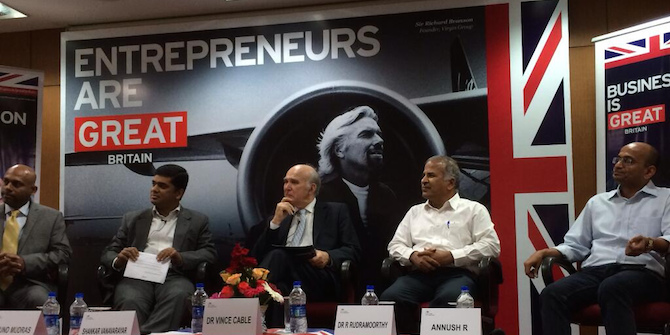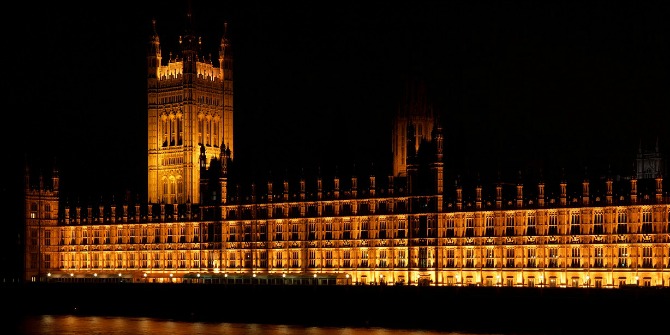 The new Independent Group of former Labour and Conservative MPs says it wishes to fix the UK’s broken politics. However, argues Jack Bridgewater, the first step in fixing politics at the centre is to reform the electoral system.
The new Independent Group of former Labour and Conservative MPs says it wishes to fix the UK’s broken politics. However, argues Jack Bridgewater, the first step in fixing politics at the centre is to reform the electoral system.
The resignation of 11 MPs from the two main parties (eight from Labour and three from the Conservatives to date, with more rumoured) to form the Independent Group, a proto-political party, has garnered much attention. Splits in parliamentary political parties summon a nervousness in our political elite that is relatively specific to the UK. This is partly because we are not used to them and partly because of the myth that a previous Labour Party split led to landslide defeats for the party in 1983 and 1987. Splits are unfamiliar to us because our first-past-the-post electoral system makes it difficult for new parties to win seats in general elections. Suspicion of break-away parties is bolstered by a two-party system that discourages fluidity of ideology and legitimises binary decision-making. This enables the two main parties to clash in a partisan manner that is unrepresentative of a diverse country and makes complex issues such as leaving the European Union more difficult to resolve.
In 2011 the UK had a now largely forgotten referendum on whether to replace our voting system with the alternative vote (AV) system, notably not a proportional system, but one that could have increased the influence of minority party voters (if not the parties themselves). This was advocated by the Liberal Democrats and was held at their request as part of the coalition agreement. It was not backed by the Conservatives, while the Labour Party was divided on the issue, and the proposal was soundly rejected by 68% of voters, who opted to stay with the current system. Taking into account the current problems our parliament is having, is first-past-the-post still working?
Our two main parties have good reason to fear transition to proportional representation, but not necessarily for the reasons often cited. Break-away parties do not usually take voters exclusively from one party. Admittedly, when the Social Democratic Party (SDP) split from Labour in 1979 they did disproportionately take with them voters who identified with the latter. However, as Crewe and King point out in SDP: The Birth, Life and Death of the Social Democratic Party it is false to claim that the party helped Margaret Thatcher win landslide victories in two elections. The voters that abandoned the Labour Party were likely going to leave anyway, and without the SDP they may have switched their votes directly to the Conservatives. Were it not for the SDP it is possible that the Conservatives would have got an even larger share of the vote.
Additionally, there is little evidence to suggest that proportional representation substantially increases the number of parties overall. In the UK for example, there is already a multitude of parties within our system that represent a broad array of positions. However, these parties are not properly represented in the House of Commons (devolved assemblies and parliaments are more proportional). The list of injustices is long, but more recent examples would be the Liberal Democrats achieving 23% of the vote in 2010 but only 9% of seats, and UKIP in 2015 achieving 13% of the vote but 1 seat.
The reason the two main parties should be wary of a change in electoral system is that it would challenge their monopoly on political power in Westminster. It would enable people to vote for parties that more closely represent their own views, without the fear that this party will not be accordingly represented in Parliament. It takes us away from binary choices and towards a system that is based on power-sharing and compromise. Both the current Labour and Conservative leadership should embrace this. They would have to worry less about being broad churches, and less about reducing their ideology to an argument about their side being better than the other. They could instead focus more on pursuing the policies they think are the correct ones and on how to cooperate with, rather than blindly oppose, other parties that have similar goals to them.
This brings us back to the Independent Group. If they truly think that ‘politics is broken’ then, rather than occupying a centre ground which already has a party that could claim to be doing the same, they should argue for a radical overall of our electoral system. This should be put ahead of all other concerns for the new party. It is unlikely that they will achieve substantial numbers of seats in any general election, so if they really want to see political change they need to change the system in which they operate. Do not blame these individuals, Conservative or Labour, for the fact that they are forced into parties that do not necessarily represent them or many of their voters as well as they could.
_____________
Note: The above was originally published on Democratic Audit. Featured image credit:Jason, via a (CC BY-NC 2.0) licence.
Jack Bridgewater is a PhD candidate in Comparative Politics at the University of Kent. He runs the podcast ‘How to Win Arguments with Numbers’ and his research focuses on voter attitudes towards party leaders. He tweets at @JLBridgewater.








Jack, your younger than I but no matter. You are nonetheless right our political system needs a radical overhaul. I am for non-partisan governance but PR is a step in the right direction. Non-partisan governance would allow a diverse advocacy of policy without the moral corruption of political parties. If you are genuine Jack let us come together and invite others to make this change.
Regards
Christopher
FPTP has been kind to the Conservatives, who constantly face an anti-Conservative vote split between a handful of centre-left progressive parties in any constituency. I suppose massive support from the UK’s many Conservative newspapers also helps.
The UK elected its first-ever majority Labour government in 1945. Since then the Conservatives have been in government for 43 years and Labour, for 30.
However, after Margaret Thatcher’s 102-majority won in in 1987 the best result that the Conservatives have managed since then is the 21-seat majority won by John Major in 1992.
In 2015 the Conservatives, too, had their vote split—a highly unusual experience for them—as some of their long-standing voters defected to UKIP. What might David Cameron’s majority have been if there had been no defections?
An x-vote is an all-or-nothing vote whther the count is simple plurality or proportional. Accuracy of representation requires a proportional count of a preference vote. Order (in the vote) and proportion (in the count) are the prerequisites of electoral reform as much as they are of the arts and sciences, indeed civiised society.
” However, as Crewe and King point out in SDP: The Birth, Life and Death of the Social Democratic Party it is false to claim that the party helped Margaret Thatcher win landslide victories in two elections.” Saying that something is false is fairly definite, but I would like more evidence. From the link cited it seems this assertion is based on second preferences in opinion polling before the 1983 and 1987 election, but that ignores the fact that the Labour Party would have been different and possibly more electable if the Gang of Four and their followers hadn’t left it. For example, would the Labour Party still have supported unilateral nuclear disarmament in 1987, had it not been for the SPD rebels? Would there have been the countless headlines about loony-left councils? SPD followers sometimes claim that they eventually brought about New Labour, but it is surely much easier to reform a party if you stay inside it.
So it seems to me entirely plausible that by splitting the Labour Party the Gang of Four really did cause the Tory victories in 1987 and 1992, and so did indeed keep the Tories in power for another ten years.
But it hasn’t really worked in Australia has it? We still have a red/blue duopoly with fewer third party parties than the UK
You refrain from proposing a particular form of Proportional Representation.
I think there is much to be said for a PR voting system that retains the single member constituency system with which we are familiar, but allows the voter the freedom vote for the candidate of their choice regardless of party, and a second vote to register support for their preferred party?
In the present circumstances this could allow constituents to elect an Independent Candidate and at the same time vote for, say, the Conservative Party.
Apart from the advantages of PR it would change the power balance in parliament between MPs and their parties, and in the constituency between the MP and their constituents, for the better.
“I think there is much to be said for a PR voting system that retains the single member constituency system with which we are familiar, but allows the voter the freedom vote for the candidate of their choice regardless of party, and a second vote to register support for their preferred party?” This is what happens in Germany. But I think it breaks the link between the voters and their directly elected representative. I would be surprised if one in ten Germans of voting age could tell you who their directly elected member of the Bundestag is, while I expect very many more Britons could name their MP. As the situation is currently set up, the first vote is almost irrelevant anyway, because the proportions in the Bundestag are decided by the second vote, so the parties don’t campaign so much on the vote-for-X-your-MP-who-gets-things-done line.